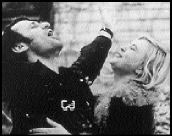DON’T EXPECT to see little Haley Joel Osment sniveling here. However, you’ll need to summon the other senses—touch, taste, smell, sight, and hearing—to fully appreciate this compelling, atmospheric film by Jeremy Podeswa. The main difference between last summer’s paranormal hit and this quiet Canadian offering is that the people are still alive—well, sort of.
THE FIVE SENSES
written and directed by Jeremy Podeswa
with Mary-Louise Parker, Philippe Volter, Daniel MacIvor, Gabrielle Rose, and Nadia Litz
opens July 28 at Harvard Exit
The five main characters represent each of the five senses, with the ironic twist that their individual sensory strengths prevent them from getting close to people emotionally and from understanding themselves. Their lives overlap when a little girl disappears and becomes the focus of a city-wide search, a metaphor for each character’s ongoing struggle to connect.
In the office building that links the five, we meet Ruth (Gabrielle Rose), a masseuse who is, quite literally, out of touch. Her hands glide between a client’s shoulder blades with slow, nurturing strokes, yet she can’t comprehend how her therapeutic powers give her clients such a sense of well-being. (She could use a good rubdown herself.) Her high-school dropout daughter Rachel (Nadia Litz) spends her time as a voyeur (sometimes disguising herself to avoid being seen).
Cake decorator Rona (Mary-Louise Parker) can’t detect that her wares taste terrible, while her visiting Italian lover—who doesn’t speak English—tries to get her to open up. Meanwhile, her bisexual housecleaner friend Robert (Daniel MacIvor) hopes to use his acute sense of smell to sniff out the scent of true love from his old flames. Richard (Philippe Volter), an eye doctor permanently separated from his wife and child, learns that he’s going deaf, and so catalogs sounds that he can commit to memory.
PARKER SHINES as the brittle, outwardly invincible Rona. She can hardly contain her I-told-you-so sneer, until she flops onto her dying mother’s couch to avoid yet another miscommunication with her Italian stud. She’s suddenly smaller against the furniture, her mother’s smile, and her own fears of intimacy in the face of losing her parent. Litz is also a standout, a study in eerie intensity that puts Christina Ricci’s Wednesday Addams to shame. She glares one moment and is blank-faced the next, preferring the role of witness rather than participant. And Canadian TV actor MacIvor (Twitch City) provides necessary comic relief as he falls for a man married to a perfume-bottle designer.
Perhaps because all their names begin with the letter R (for resignation? repression?), the five men and women appear less like distinct, well-rounded people than fragmented physical manifestations of one unifying concept: that to be a whole person, you must be able to rely on all five senses to balance your strengths and your weaknesses. It’s a lesson that might seem shallow or disappointing in less adept hands, but Podeswa’s careful attention to performance and detail in his talented cast gives The Five Senses more subtlety and resonance than its plot summary would imply.
Podeswa respects his characters’ anxieties and compulsions, from Rachel’s need to watch two people having sex in the bushes to Rona’s dismissal of her hunky Italian’s sexual and culinary prowess. He’s patient with their failures and their halting progress in life, and he ties their stories together with a spare, otherworldly melody (an 18th-century Italian love song by Caccini) that serves as the film’s refrain. The resulting visual and aural tapestry unfurls like a poem that’s both gratifying and bittersweet.








